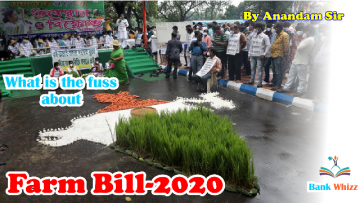
With the motif of changing the very face of Indian agriculture, the Indian President Shri Ramnath Kovind gave his assent to the three Agriculture Bills on September 27, 2020 and thus turning these into Acts. The Honourable Prime Minister called the Acts ‘historic and necessary’ for the country to move forward. The Agriculture Minister called these ‘revolutionary in the lives of farmers’.
The three Acts are as follows:
- The Farmers’ Produce Trade and Commerce (Promotion and Facilitation) Act 2020
- The Farmers (Empowerment and Protection) Agreement of Price Assurance and Farm Services Act 2020
- The Essential Commodities (Amendment) Act 2020
Though the government asserts that the reforms in the Acts will bring about a lot of positive changes in the lives of farmers by doubling their income in the coming two years yet the reforms have invited a lot of criticism on behalf of farmers’ unions and opposition parties. According to such unions and parties, the reforms will end MSP which is the lifeline for small and marginal farmers. Thus the farmers’ plight will exacerbate. The existence of APMCs will end in the future and the farmers will be forced to sell their yields to private entities that will not give them reasonable prices. In this way, their future will become bleak. They also fear that the promotion of contract farming will allow corporate investments and they will be forced to produce according to the choice of such corporate. Thus they will turn out to be labourers in their own lands. Also, they oppose the idea of giving a free hand to the black marketeers to hoard grains even in times of shortage and thus causing inflation in the country.
Benefits of the Acts
The new Farm Acts are set to benefit all kinds of farmers whether small, marginal, or big. Others who will gain considerably from the reforms are agri-tech startups, Agri warehouses, and organized players in the food trade. Other benefits of the reforms in the Acts will be as follows:
- The reforms in the Acts are progressive and visionary, which will make the government’s mission of doubling farmers’ incomes by 2022 a reality.
- India consists of a large number of small and marginal farmers who constitute 80 percent of Indian agriculture. The reforms will benefit such farmers massively by giving them options to sell their agricultural produce even out of the local mundis called APMCs. In this way, they will not be victims at the hands of corrupt officials who do not give reasonable prices for their agricultural produce by falsely calling it inferior in quality. Neither will they be cheated at the hands of intermediaries. Thus, they will get freedom from the strong clutch of both corrupt officials of APMCs and intermediaries.
- If the farmers have an agreement with a corporate, their interests will be safeguarded. They will get modern tools and high-quality seeds and manures for better yields as the agreement will rest on mutual profits.
- The massive investments in agriculture will promote state-of-the-art technology to get high yields. The small and marginal farmers who cannot get better yields for lack of capital will start using scientific methods of doing agriculture. They will have not to bother about searching for better markets for sale as the company they will be in agreement with will make the markets. Thus, they will be highly benefited and profited from many fronts.
- The market for the farmers will be open for the sale of agricultural produce. The market being open, will be highly competitive. The farmers will have multi-options to sell out their products at higher prices.
Challenges
Since the approval of the reforms in the Acts, there has been a continuous protest by farmers’ unions especially those belonging to Punjab, Haryana, and Rajasthan. The farmers have closed the Delhi borders-Singhu and Tikri- in protest of these. Their protest is said to have been hijacked by some political parties. Thus the very sentiment of the protest seems to have lost. However, the farmers’ gathering keeps rising posing threats to India’s security. Thus, the main challenge of the government is to convince such farmers.
Conclusion
The protest has been going on for a long time and the Delhi borders are still sealed causing a lot of problems for the local people. National security is at stake. And so the government is on the effort to convince the formers through various means so that normalcy may be restored. It has kept its dialogues on with the farmers, which is a good indication. PM Narendra Modi has assured them of safeguarding their interest by all means.


